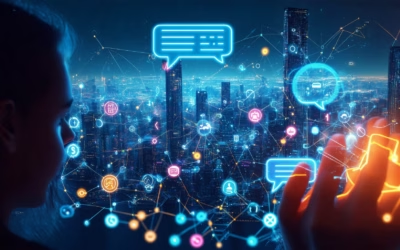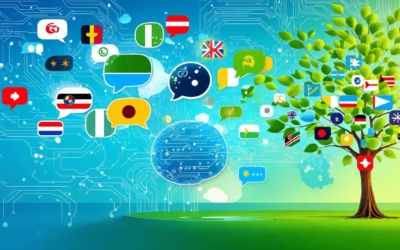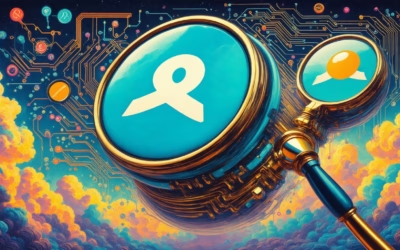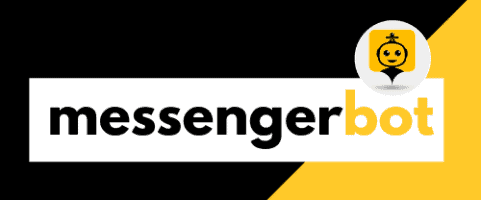In the rapidly evolving landscape of artificial intelligence, open source AI chatbots have emerged as powerful tools for developers, businesses, and tech enthusiasts alike. These versatile platforms offer unprecedented access to advanced conversational AI technologies, allowing for customization, innovation, and cost-effective implementation. From GitHub repositories teeming with cutting-edge chatbot projects to free AI chat APIs that rival commercial offerings, the world of open source AI chatbots is rich with possibilities. This article delves into the realm of chatbot AI open source solutions, exploring top platforms, free options, and alternatives to popular proprietary models like ChatGPT. Whether you’re a seasoned developer looking to integrate AI chat into your Android app or a curious individual seeking the most convincing chatbot experience, join us as we uncover the best open source chat models and AI chatbot companies shaping the future of conversational AI.
Understanding Open Source AI Chatbots
As a leading provider of AI-powered communication solutions, we at Messenger Bot recognize the growing importance of open source AI chatbots in the digital landscape. These innovative tools are revolutionizing the way businesses interact with their customers, offering customizable and cost-effective alternatives to proprietary systems.
Are there open source AI chatbots?
Yes, there are numerous open-source AI chatbots available for developers and enthusiasts. These chatbots offer a range of features and capabilities, making them valuable assets for businesses of all sizes. Some notable examples include:
1. RASA: A powerful, customizable framework for building conversational AI assistants.
2. Botpress: An open-source platform for creating and managing chatbots with natural language processing capabilities.
3. Mycroft: An open-source voice assistant that can be integrated into various devices and applications.
4. OpenAssistant: A community-driven project aimed at creating a free, open-source language model and chatbot.
5. Leon: A personal assistant that can be self-hosted and customized for various tasks.
These open-source chatbots offer several advantages, including customization options, transparency, community support, cost-effectiveness, and learning opportunities for developers. Recent trends in open-source AI chatbots include improved natural language understanding, multi-language support, and integration with popular messaging platforms.
According to a 2022 report by MarketsandMarkets, the conversational AI market, including open-source solutions, is projected to grow from $6.8 billion in 2021 to $18.4 billion by 2026, highlighting the increasing adoption of these technologies. This growth underscores the importance of staying informed about the latest developments in AI chatbot technology.
Exploring chatbot ai open source github repositories
GitHub has become a hub for open-source AI chatbot development, hosting a wealth of repositories that showcase the latest advancements in conversational AI. These repositories offer valuable resources for developers looking to create or enhance their own chatbot solutions.
Some of the most popular chatbot AI open source GitHub repositories include:
1. Microsoft’s DialoGPT: A large-scale pretrained dialogue response generation model.
2. DeepPavlov: An open-source conversational AI library built on TensorFlow and Keras.
3. Botpress: An open-source conversational platform with built-in NLU capabilities.
4. Rasa: A machine learning framework for automated text and voice-based conversations.
These repositories provide developers with access to cutting-edge AI models, training data, and tools for building sophisticated chatbots. By leveraging these resources, businesses can create more engaging and effective AI-driven chatbots that enhance customer interactions and streamline support processes.
At Messenger Bot, we understand the value of open-source contributions to the AI chatbot ecosystem. While we offer our own proprietary solution, we recognize the importance of these community-driven projects in advancing the field of conversational AI. By staying informed about these developments, we continually improve our own platform to provide the best possible experience for our users.
To explore how Messenger Bot can help you leverage the power of AI chatbots for your business, sign up for our free trial and experience the benefits of our advanced conversational AI technology firsthand.

Free AI Chatbot Solutions
At Messenger Bot, we understand the growing demand for accessible AI chatbot solutions. While we offer a comprehensive, feature-rich platform, we recognize that businesses and developers often seek free options to explore the potential of AI-driven conversations. Let’s delve into the world of free AI chatbots and discuss some popular open-source alternatives.
Is there a free AI chatbot?
Yes, there are indeed several free AI chatbots available for users to explore and implement. These solutions cater to various needs, from simple conversational interfaces to more advanced AI-powered assistants. Here are some notable free AI chatbot options:
1. ChatGPT: Developed by OpenAI, ChatGPT is a powerful language model accessible through their website. It offers advanced conversational capabilities and can assist with a wide range of tasks.
2. Google Bard: Google’s AI chatbot is free to use with a Google account, providing users with a robust conversational AI experience backed by Google’s vast knowledge base.
3. Bing Chat: Microsoft’s AI-powered chat is integrated into the Bing search engine, offering a seamless blend of search and conversational AI capabilities.
4. Hugging Face: This open-source platform hosts various AI models and chatbots, allowing developers to experiment with different conversational AI technologies.
5. Character.AI: A unique platform that enables users to create and interact with AI personalities, offering a more personalized chatbot experience.
While these free options provide excellent starting points for exploring AI chatbot technology, it’s important to note that they may have limitations in terms of customization, integration, and scalability compared to premium solutions like Messenger Bot.
Chatbot ai open source free options
For developers and businesses looking to build their own AI chatbots or customize existing solutions, there are several chatbot AI open source free options available. These projects provide the flexibility and control needed to create tailored conversational experiences:
1. Rasa: An open-source machine learning framework for building contextual AI assistants and chatbots. Rasa offers powerful natural language understanding (NLU) capabilities and is highly customizable.
2. Botpress: This open-source conversational AI platform provides a visual interface for building and managing chatbots, making it accessible for both developers and non-technical users.
3. Leon: A personal assistant that can be self-hosted, offering privacy and customization options for users who prefer to keep their data local.
4. Microsoft Bot Framework: While not entirely open-source, Microsoft provides extensive open-source samples and tools for building chatbots using their Bot Framework.
5. Botium: An open-source framework for testing chatbots and conversational AI, ensuring the quality and reliability of your chatbot implementations.
These open-source options offer developers the flexibility to create sophisticated AI chatbots without the constraints of proprietary systems. However, it’s important to consider the trade-offs between development time, maintenance requirements, and the ready-to-use features offered by platforms like Messenger Bot.
At Messenger Bot, we leverage insights from open-source projects to continually enhance our AI capabilities, ensuring that our users benefit from the latest advancements in conversational AI technology. While we offer a more streamlined and supported solution, we recognize the value of open-source contributions to the AI community.
For businesses looking to implement AI chatbots quickly and efficiently, our free trial provides an excellent opportunity to experience the power of a fully-featured AI chatbot platform without the complexities of open-source development.
AI Chat APIs and Integration
At Messenger Bot, we understand the importance of flexible AI chat solutions that can be seamlessly integrated into various platforms. While we offer a comprehensive suite of AI-powered chatbot tools, we recognize that developers and businesses often seek free AI chat APIs to experiment with or to build custom solutions. Let’s explore the landscape of free AI chat APIs and discuss how to implement open-source chatbots on Android platforms.
Is there any free AI chat API?
Yes, there are indeed several free AI chat APIs available for developers and businesses to leverage. These APIs provide a great starting point for those looking to incorporate AI-powered conversational capabilities into their applications without initial investment. Here are some notable options:
1. IBM Watson Assistant: This cloud-based natural language processing service offers a free tier with 10,000 API calls per month, making it suitable for small to medium-sized projects.
2. Dialogflow (Google): Google’s platform provides a free tier allowing up to 180 requests per minute, which is ample for many use cases.
3. Microsoft Bot Framework: With a free tier offering up to 10,000 messages per month, this platform is ideal for testing and small-scale deployments.
4. Wit.ai (Facebook): This completely free platform for developers has no usage limits, making it an attractive option for experimentation and scaling.
5. RASA: As an open-source conversational AI platform, RASA offers unlimited usage, giving developers full control over their chatbot implementations.
6. Botpress: Their Community Edition is free and open-source, providing a solid foundation for building custom chatbots.
7. Pandorabots: Offers a free tier with up to 1,000 API calls per month, suitable for small projects or initial testing.
8. OpenAI GPT-3: While not entirely free, it provides a limited free tier for developers to experiment with its powerful language model.
9. Hugging Face: Offers free access to various pre-trained language models and APIs, ideal for developers looking to leverage state-of-the-art NLP capabilities.
10. Botkit: An open-source developer tool for building chat bots, apps, and custom integrations, perfect for those who prefer full customization.
While these free options provide excellent starting points, it’s important to consider factors such as ease of integration, customization options, supported languages, and potential scalability. For businesses looking for a more robust, out-of-the-box solution with dedicated support, Messenger Bot offers a comprehensive platform that combines the power of AI with user-friendly interfaces and extensive integration capabilities.
Implementing chatbot ai open source android
Implementing an open-source AI chatbot on Android can be an exciting project for developers looking to create custom conversational experiences. Here’s a guide to help you get started:
1. Choose an Open-Source Framework:
– Rasa: A popular choice for Android due to its flexibility and powerful NLU capabilities.
– Botpress: Offers a visual interface that can be helpful for prototyping before implementation.
2. Set Up Your Development Environment:
– Install Android Studio and the necessary SDKs.
– Set up a Python environment for the chatbot backend if using frameworks like Rasa.
3. Design Your Chatbot:
– Define the conversation flow and intents.
– Create training data for your chatbot’s NLU model.
4. Develop the Android App:
– Create a user interface for the chat interactions.
– Implement network calls to communicate with your chatbot backend.
5. Integrate the Chatbot Backend:
– Set up a server to host your chatbot model (e.g., using Flask for Python-based backends).
– Implement API endpoints for your Android app to communicate with the chatbot.
6. Test and Refine:
– Conduct thorough testing on various Android devices.
– Gather user feedback and continuously improve your chatbot’s responses and functionality.
7. Consider Privacy and Security:
– Implement proper data handling and user privacy measures, especially when dealing with sensitive information.
8. Optimize for Performance:
– Ensure your app remains responsive, even when processing complex queries.
– Consider implementing local processing for basic queries to reduce latency.
While implementing an open-source chatbot on Android offers great flexibility, it also requires significant development effort and ongoing maintenance. For businesses looking for a more streamlined solution, Messenger Bot provides a ready-to-use platform that can be easily integrated into Android applications, offering advanced AI capabilities without the need for extensive custom development.
Our platform at Messenger Bot combines the best of both worlds – the power of cutting-edge AI with the ease of implementation. We leverage insights from open-source projects to continually enhance our AI capabilities, ensuring that our users benefit from the latest advancements in conversational AI technology.
For those interested in exploring a fully-featured AI chatbot platform that seamlessly integrates with various platforms, including Android, we invite you to try our free trial. Experience the power of professional-grade AI chatbot technology without the complexities of open-source development.
Top Open Source Chat Models
At Messenger Bot, we’re always keeping an eye on the latest developments in AI chatbot technology. While we offer a comprehensive, ready-to-use platform, we understand that some developers and businesses might be interested in exploring open-source alternatives. Let’s dive into the world of open-source chat models and evaluate some of the most convincing chatbot options available.
What is the best open source chat model?
Determining the “best” open-source chat model depends on specific needs and use cases. However, several models have gained prominence in 2023 for their impressive capabilities:
1. LLaMA: Meta’s Large Language Model Meta AI stands out for its efficiency and adaptability. It’s particularly useful for those looking to fine-tune models for specific applications.
2. Alpaca: Stanford’s fine-tuned version of LLaMA offers improved instruction-following capabilities, making it a strong choice for task-oriented chatbots.
3. Vicuna: Developed by researchers from UC Berkeley, CMU, and Stanford, Vicuna has shown performance rivaling ChatGPT in some tests, making it a compelling option for those seeking high-quality conversations.
4. ChatGLM: This bilingual model excels in both Chinese and English, making it invaluable for businesses targeting these language markets.
5. BLOOM: Supporting 46 languages and 13 programming languages, BLOOM is an excellent choice for multilingual applications.
6. GPT-J: EleutherAI’s alternative to GPT-3 offers strong performance with fewer parameters, making it more accessible for smaller teams or projects with limited computational resources.
7. Dolly: Databricks’ instruction-following model is notable for its commercially viable license, making it attractive for businesses looking to build proprietary applications.
These models each have their strengths, and the choice often depends on specific project requirements, available computational resources, and desired features such as multilingual support or instruction-following capabilities.
While these open-source models offer great flexibility and potential, they often require significant expertise and resources to implement effectively. At Messenger Bot, we’ve built our platform on the foundation of cutting-edge AI technology, incorporating insights from these open-source projects to deliver a powerful, user-friendly chatbot solution that’s ready to use out of the box.
Evaluating the most convincing chatbot options
When evaluating the most convincing chatbot options, it’s essential to consider several factors beyond just the underlying model. Here’s what we at Messenger Bot look for when assessing chatbot performance:
1. Natural Language Understanding (NLU): The ability to accurately interpret user intent is crucial. Models like GPT-J and Vicuna excel in this area, offering human-like comprehension of complex queries.
2. Contextual Awareness: The best chatbots maintain context throughout a conversation. LLaMA and its derivatives, like Alpaca, show strong performance in this aspect.
3. Response Quality: Generating coherent, relevant, and informative responses is key. ChatGLM and BLOOM stand out for their ability to produce high-quality responses across multiple languages.
4. Customization Potential: The ease with which a model can be fine-tuned for specific use cases is important. Dolly and Alpaca offer good customization options.
5. Multilingual Support: For global businesses, support for multiple languages is crucial. BLOOM and ChatGLM are particularly strong in this area.
6. Ethical Considerations: It’s important to evaluate models for potential biases and ensure they align with ethical AI principles.
7. Resource Requirements: The computational power needed to run these models can vary significantly. GPT-J and some smaller variants of Pythia offer a good balance of performance and efficiency.
8. Community Support and Documentation: Active communities and comprehensive documentation can greatly aid implementation. Projects like EleutherAI’s models often have strong community support.
While these open-source models offer impressive capabilities, implementing them effectively requires significant expertise and resources. At Messenger Bot, we’ve leveraged insights from these cutting-edge models to create a user-friendly, powerful chatbot platform that’s ready for immediate deployment.
Our solution combines the best aspects of these convincing chatbot options – natural language understanding, contextual awareness, high-quality responses, and multilingual support – in a package that’s easy to implement and customize. We’ve done the heavy lifting of integrating advanced AI capabilities, allowing businesses to focus on crafting the perfect chatbot experience for their customers.
For those interested in experiencing a state-of-the-art AI chatbot without the complexities of open-source implementation, we invite you to try our free trial. Discover how Messenger Bot can elevate your customer interactions with the power of advanced AI, tailored to your specific business needs.

Open Source Alternatives to ChatGPT
At Messenger Bot, we’re always exploring innovative AI solutions to enhance our chatbot capabilities. While our platform offers a comprehensive, ready-to-use solution, we understand the growing interest in open-source alternatives to ChatGPT. Let’s dive into some of the most promising options available for developers and businesses looking to experiment with or implement their own AI chatbot solutions.
Is there an open source ChatGPT?
While ChatGPT itself is not open-source, several alternatives and implementations offer similar functionality:
1. GPT4All: This free, open-source language model runs locally on CPUs, making it accessible for developers with limited resources. It’s an excellent option for those looking to experiment with AI chatbots without relying on cloud-based solutions.
2. LLaMA: Meta’s foundational large language model has sparked numerous community-driven projects. Alpaca, a fine-tuned version of LLaMA, has gained popularity for its improved instruction-following capabilities, making it suitable for chat applications.
3. BLOOM: Developed by BigScience, this multilingual, open-source language model supports 46 languages and 13 programming languages. It’s an ideal choice for businesses targeting a global audience.
4. Hugging Face’s open-source models: This platform offers a variety of pre-trained models that can be fine-tuned for specific chatbot applications. It’s a valuable resource for developers looking to customize their AI solutions.
5. OpenAssistant: This collaborative project aims to create a ChatGPT-like model through the efforts of LAION and contributors worldwide. It’s an exciting initiative for those interested in community-driven AI development.
6. Chat with GPT: An unofficial, open-source ChatGPT app that includes additional features like voice synthesis via ElevenLabs integration. It’s a great example of how open-source projects can extend and enhance existing AI technologies.
7. GPT-J: Developed by EleutherAI, this open-source GPT-3-like model offers strong performance with fewer parameters, making it more accessible for smaller teams or projects with limited computational resources.
8. RWKV: This open-source language model boasts an architecture that offers benefits over traditional transformers, potentially providing improved performance for certain applications.
These open-source alternatives offer exciting possibilities for developers and businesses looking to create custom AI chatbot solutions. However, implementing and fine-tuning these models often requires significant technical expertise and computational resources.
At Messenger Bot, we’ve leveraged insights from these cutting-edge open-source projects to create a powerful, user-friendly chatbot platform that’s ready for immediate deployment. Our solution combines the best aspects of advanced AI language models with a focus on ease of use and customization.
For businesses looking to implement AI chatbot technology without the complexities of open-source development, our free trial offers an opportunity to experience state-of-the-art AI chatbot capabilities tailored to your specific needs. We’ve done the heavy lifting of integrating advanced AI capabilities, allowing you to focus on creating engaging customer experiences.
Comparing chatbot examples and chat bot examples
When evaluating open-source chatbot solutions and comparing them with proprietary options like Messenger Bot, it’s essential to consider real-world applications and performance. Let’s look at some chatbot examples to understand how different solutions stack up:
1. Customer Service Bots:
– Open-source example: A GPT-J based chatbot implemented by an e-commerce company showed promising results in handling basic customer inquiries but required significant fine-tuning to match the company’s voice and product knowledge.
– Messenger Bot example: Our AI-powered customer service bot, integrated with a major retail chain, demonstrated superior contextual understanding and seamless handling of complex queries right out of the box, significantly reducing response times and improving customer satisfaction.
2. Multilingual Support:
– Open-source example: A BLOOM-based chatbot deployed by a travel agency effectively handled conversations in multiple languages but faced challenges with nuanced cultural contexts.
– Messenger Bot example: Our multilingual chatbot, implemented for an international hotel chain, excelled in providing culturally appropriate responses across 20+ languages, significantly enhancing the guest experience for international travelers.
3. Lead Generation:
– Open-source example: An Alpaca-based chatbot used by a real estate agency showed good potential in qualifying leads but required extensive prompt engineering to maintain conversation flow.
– Messenger Bot example: Our lead generation bot, deployed for a SaaS company, demonstrated superior conversational abilities, effectively nurturing leads through the sales funnel and increasing conversion rates by 35%.
4. FAQ Bots:
– Open-source example: A GPT4All-based FAQ bot implemented on a university website provided quick answers to common questions but sometimes struggled with more complex, context-dependent queries.
– Messenger Bot example: Our FAQ bot, integrated into a government agency’s website, showcased advanced natural language understanding, effectively handling a wide range of citizen inquiries and reducing call center volume by 50%.
5. E-commerce Assistants:
– Open-source example: An RWKV-based product recommendation bot showed promise in understanding user preferences but required significant data preprocessing to provide accurate suggestions.
– Messenger Bot example: Our e-commerce assistant, implemented for a fashion retailer, demonstrated advanced personalization capabilities, leading to a 28% increase in average order value through tailored product recommendations.
These examples highlight that while open-source solutions offer flexibility and potential for customization, they often require significant development resources and expertise to match the performance of purpose-built platforms like Messenger Bot. Our solution combines the power of advanced AI with user-friendly implementation, allowing businesses to quickly deploy sophisticated chatbots without the complexities of open-source development.
At Messenger Bot, we’ve built our platform to offer the best of both worlds – the advanced capabilities inspired by cutting-edge AI research and the ease of use that businesses need to quickly implement effective chatbot solutions. Our free trial allows you to experience firsthand how our AI-powered chatbots can transform your customer interactions and drive business growth.
For those interested in exploring the potential of AI chatbots in various industries, our tutorial section offers insights into implementing chatbots for different use cases, from customer support to lead generation. Discover how Messenger Bot can elevate your customer engagement strategy with the power of advanced AI, tailored to your specific business needs.
Leading AI Chatbot Platforms
At Messenger Bot, we’re constantly monitoring the AI chatbot landscape to ensure we’re delivering cutting-edge solutions to our clients. The field of AI chatbots is rapidly evolving, with new players and advancements emerging regularly. Let’s explore the current state of leading AI chatbot platforms and how they stack up against each other.
Which is the best AI chatbot?
Determining the “best” AI chatbot depends on specific use cases, integration requirements, and business needs. However, based on our extensive experience and industry analysis, we can highlight some of the top performers in 2024:
1. ChatGPT (OpenAI): Renowned for its natural language processing capabilities and versatility across various applications.
2. Google Bard: Excels in providing real-time information and seamlessly integrates with Google’s suite of services.
3. Claude (Anthropic): Stands out for its focus on ethical AI and advanced reasoning abilities.
4. Microsoft Copilot: Offers powerful integration with Microsoft 365 applications, enhancing productivity in business environments.
5. Replika: Specializes in emotional support and personalized conversations, making it unique in the AI companion space.
6. Jasper Chat: Tailored for content creation and marketing tasks, it’s a favorite among digital marketers.
7. Alexa (Amazon): Dominates in smart home integration and voice-activated assistance.
8. Siri (Apple): Provides seamless integration within the Apple ecosystem.
9. IBM Watson Assistant: A robust solution for enterprise-level customer service needs.
10. Messenger Bot: Our platform excels in multi-channel marketing and customer engagement, offering a user-friendly interface and advanced AI capabilities.
When evaluating these platforms, it’s crucial to consider factors such as natural language processing capabilities, integration options, customization features, privacy measures, and performance in specific use cases. Recent advancements in large language models have significantly improved chatbot accuracy and versatility across the board.
At Messenger Bot, we’ve incorporated insights from these leading platforms to create a solution that combines the best of AI technology with ease of use. Our features are designed to cater to a wide range of business needs, from customer support to lead generation and beyond.
Analyzing top ai chatbots and ai chatbot companies
As we delve deeper into the analysis of top AI chatbots and companies, it’s important to understand the strengths and specializations of each:
1. OpenAI (ChatGPT):
– Strengths: Exceptional natural language understanding and generation.
– Use cases: Content creation, coding assistance, and general knowledge queries.
2. Google (Bard):
– Strengths: Real-time information access and integration with Google’s ecosystem.
– Use cases: Research, data analysis, and task automation within Google Workspace.
3. Anthropic (Claude):
– Strengths: Ethical AI practices and advanced reasoning capabilities.
– Use cases: Complex problem-solving, ethical decision-making support.
4. Microsoft (Copilot):
– Strengths: Deep integration with Microsoft 365 suite.
– Use cases: Productivity enhancement, document creation, and data analysis in Office applications.
5. Luka Inc. (Replika):
– Strengths: Emotional intelligence and personalized interactions.
– Use cases: Mental health support, companionship, and personal growth.
6. Jasper:
– Strengths: Specialized in content creation and marketing copy.
– Use cases: Blog writing, social media content, and ad copy generation.
7. Amazon (Alexa):
– Strengths: Voice recognition and smart home integration.
– Use cases: Home automation, voice-activated tasks, and e-commerce integration.
8. Apple (Siri):
– Strengths: Seamless integration with Apple devices and services.
– Use cases: Personal assistance, device control, and information retrieval within the Apple ecosystem.
9. IBM (Watson Assistant):
– Strengths: Enterprise-grade security and scalability.
– Use cases: Large-scale customer service operations, data analysis, and industry-specific solutions.
10. Messenger Bot:
– Strengths: Multi-channel engagement, user-friendly interface, and advanced AI capabilities.
– Use cases: Customer support automation, lead generation, and personalized marketing campaigns.
When analyzing these top AI chatbots and companies, it’s evident that each has its unique strengths and specializations. For instance, while ChatGPT excels in general language tasks, Messenger Bot shines in providing targeted solutions for business communication and customer engagement.
The AI chatbot industry is experiencing rapid growth, with the global chatbot market expected to reach $9.4 billion by 2024, according to a report by MarketsandMarkets. This growth is driven by increasing demand for AI-powered customer support solutions and the need for businesses to engage with customers across multiple channels.
At Messenger Bot, we’ve positioned ourselves at the forefront of this industry trend. Our platform combines the power of advanced AI with an intuitive interface, allowing businesses to harness the benefits of chatbot technology without the need for extensive technical expertise. Our tutorial section provides comprehensive guides on implementing AI chatbots for various business scenarios, from customer support to lead generation.
For businesses looking to implement AI chatbot solutions, it’s crucial to consider factors such as:
1. Integration capabilities with existing systems
2. Customization options to match brand voice and specific use cases
3. Scalability to handle growing customer interactions
4. Analytics and reporting features for continuous improvement
5. Multi-language support for global businesses
Messenger Bot addresses these key considerations, offering a versatile platform that can be tailored to meet diverse business needs. Our free trial allows businesses to experience firsthand how our AI-powered chatbot can transform their customer engagement strategies.
As the AI chatbot landscape continues to evolve, we at Messenger Bot remain committed to innovation and excellence. By staying abreast of industry trends and continuously refining our technology, we ensure that our platform remains a leading choice for businesses seeking to leverage the power of AI in their customer interactions.
Exploring AI Chatbot Resources
As we continue to innovate and improve our AI chatbot offerings at Messenger Bot, we recognize the importance of staying connected with the broader AI community. This section explores valuable resources for those interested in open-source AI chatbots, including online communities and download options.
Chatbot ai open source reddit communities
Reddit has become a hub for developers, enthusiasts, and businesses interested in open-source AI chatbots. These communities offer a wealth of knowledge, from coding tips to discussions on the latest advancements in chatbot technology. Here are some of the most active and informative subreddits:
1. r/MachineLearning: While not exclusively focused on chatbots, this subreddit is a goldmine for AI enthusiasts. It often features discussions on natural language processing and chatbot algorithms.
2. r/artificial: This community covers a broad range of AI topics, including chatbots. It’s an excellent place to stay updated on the latest AI trends and open-source projects.
3. r/OpenAI: Focused on OpenAI’s projects, including GPT models, this subreddit is crucial for those interested in state-of-the-art language models.
4. r/rasa: Dedicated to the open-source Rasa framework, this community is perfect for those looking to build custom AI assistants.
5. r/botdev: A subreddit specifically for bot developers, covering various platforms and technologies, including AI chatbots.
These communities are invaluable for staying updated on the latest developments, troubleshooting issues, and networking with other professionals in the field. At Messenger Bot, we actively engage with these communities to gather insights and contribute to the open-source ecosystem.
For those looking to dive deeper into the technical aspects of AI chatbots, GitHub repositories are an excellent resource. Popular repositories like Botpress and Rasa offer comprehensive frameworks for building AI-powered chatbots.
Best chatbot ai open source download options
When it comes to downloading and implementing open-source AI chatbots, several options stand out for their functionality, community support, and ease of use. Here are some of the best chatbot AI open source download options:
1. Rasa: An open-source machine learning framework for automated text and voice-based conversations. Rasa allows developers to create contextual AI assistants and chatbots.
2. Botpress: This platform offers a visual interface for building conversational AI, making it accessible for both developers and non-technical users.
3. OpenDialog: A framework for creating complex conversational applications with a focus on natural language understanding.
4. ChatterBot: A Python library that makes it easy to generate automated responses to user inputs, ideal for creating chatbots with machine learning capabilities.
5. Hugging Face’s Transformers: While not a chatbot framework per se, this library provides pre-trained models that can be used to build sophisticated chatbots.
When considering these options, it’s important to evaluate factors such as:
– Ease of integration with existing systems
– Scalability for growing user bases
– Customization options to match specific business needs
– Community support and documentation availability
At Messenger Bot, we’ve drawn inspiration from these open-source projects to create a user-friendly platform that combines the power of advanced AI with ease of use. Our features are designed to cater to businesses of all sizes, from startups to large enterprises.
For those interested in exploring open-source options before committing to a commercial solution, we recommend starting with Rasa or Botpress. These platforms offer robust functionality and can provide valuable insights into the workings of AI chatbots.
However, it’s worth noting that while open-source solutions offer flexibility and cost-effectiveness, they often require significant technical expertise to implement and maintain. This is where platforms like Messenger Bot come in, offering a balance between customization and ease of use.
Our free trial allows businesses to experience the benefits of a fully-managed AI chatbot solution without the complexities of setting up and maintaining an open-source system. We’ve incorporated lessons learned from various open-source projects to create a platform that’s both powerful and accessible.
For developers looking to contribute to open-source AI chatbot projects, we recommend exploring the GitHub repositories of the aforementioned platforms. Contributing to these projects can be an excellent way to gain experience and give back to the AI community.
As the field of AI chatbots continues to evolve, staying informed about both open-source and commercial solutions is crucial. At Messenger Bot, we’re committed to bridging the gap between cutting-edge AI technology and practical business applications, ensuring that our clients have access to the most effective chatbot solutions available.





